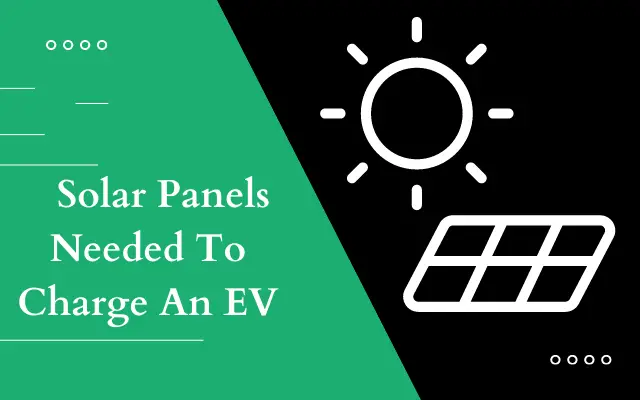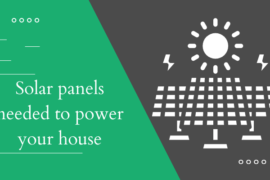Last Updated on July 5, 2024 by Rose Morah
Installing solar panels is one of the best investments you can ever make when you want to efficiently charge your EV at home.
For the couple of years that I have been using solar panels, I have managed to cut my electricity bill from $300 to about $10 monthly.
There are even months that I get 0$ electric bills. These are mainly months that have more hours of sunlight.
Additionally, power outages are now a thing of the past since I no longer rely on any supplier to supply my house with electricity.
Essentially, installing the solar system in my house has been a good move and most EV homeowners will agree to it.
But before you install the solar panels, it is extremely important to first find out how many solar panels will be needed to charge your EV at home.
Related: How many Solar Panels You Need To Power Your House (Complete Guide).
In this article, we are going to discuss how to calculate the solar panels you will need to charge your EV.
What is required in the calculation
You will need to have the following information in order to know how many solar panels will be needed to efficiently charge your EV:
- The battery capacity of your EV.
- The range of your EV.
- The number of miles you cover on a daily basis
- The number of hours that you get maximum sunlight (Insolation).
For example, if you have a Tesla Model 3, this is how you will calculate the number of solar panels you will need to charge the car:
Battery capacity = 73.5kWh
Range = 358 miles
Daily commute = 55 miles
Number of hours you get the ideal sunlight = 5 hours
Step 1: Calculate the kWh per mile
First, you will need to take the battery capacity and divide it by the range of the EV.
In our case this will be;
73.5kWh ÷ 358 miles = 0.2053kWh/miles
This basically means that for every mile that you drive the Tesla Model 3, it is consuming 0.2053 kWh of energy.
See also:
Tesla Solar VS Other Solar Companies: Is Tesla Solar Worth It?
Is Renting Tesla Solar Panels Worth It?
Step 2: Calculate the total kWh per day
To calculate the total kWh per day, you will need to take the amount of energy the EV consumes per mile and multiply it by the number of miles covered on a daily basis, which in our case is 53 miles.
55 miles x 0.2053 kWh/miles = 11.3 kWh/day
11.3 kWh is the total electric consumption of your daily commute.
Step 3: Determine the solar system size that you will need to charge the EV
You will take your’s vehicle’s electric consumption per day and divide it by the number of hours that you get ideal sunlight.
In my case, the number of hours I get ideal sunlight is 5 hours. You should note that the number of hours will varies based on your geographical location.
In this case, this will come to:
11.3 kWh/day ÷ 5 hours = 2.3kW
So, 2.3kW is the total amount of solar capacity that will be needed daily.
However, since there’s always some energy loss in power conversion, you do not always get the 100% of energy when charging your EV. The same applies to solar energy which is not always 100% efficient.
Therefore, I would recommend increasing the 2.3kW by about 20% to account for the lost energy from the solar panels and when charging your EV.
This means that instead of working with a 2.3kW system I would instead recommend a 2.7kW system to cover the energy losses.
See also: Cheap Ways To Charge Your Tesla & Other EVs.
Factors to consider before installing a solar panel to charge your EV
- Depending on your needs, you may need to choose between a smart EV home charger vs. a non-smart charger.
For instance, if you want your EV to pull more solar energy from the solar system when charging, you will need to consider getting a smart charger.
Smart chargers are also able to divert solar energy to charge the EV.
- Remember to plan for the poor winter performance rather than focusing solely on the summer performance.
If you live in places that receive longer winters/cold seasons in a year, you may need to ask yourself if installing solar panels would be a good investment.
Note that, during the cold season, you will use more heat and AC.
- What time of the day do you mostly charge your EV?
If you mostly charge in the evening and rarely during the day, then you can consider installing a battery to store the solar energy produced during the day.
- Find out if there’s anything that would affect the amount of solar energy produced by your solar panels.
For example, you need to find out:
- How much shading your rooftop gets.
- Where does your roof face?
We have a detailed article on what to consider before installing solar panels at home.
- How powerful are the solar panels that you plan on getting?
Solar panels have different efficiencies. The higher the solar panel efficiency the higher its wattage ratings, which basically means that it will generate more electricity.
Final Word
Installing a solar system to charge your EV can be a good investment, if done right, but can also be a great mistake.
Therefore, you need to properly evaluate if it is really worth it, and also don’t forget to calculate how long it will take to break even.




